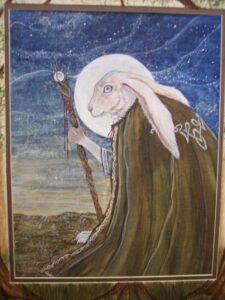It’s Halloween week, the time for witches and goblins and ghosts. But do you know about real “witches”? I put that in quotation marks because in the 17th century it was their persecutors who gave them that name. These were Cunning Women (or men) who mostly meant no harm. My upcoming novel, BITTER MAGIC, is based on the true story of a 17th century woman in the Highlands of Scotland, Isobel Gowdie, who was captured and condemned as a witch. Isobel was a Cunning Woman, healer, psychic, visionary, and perhaps a shaman. (and when it came to her persecutors, she did mean harm!)
Here is an excerpt from the novel:
Isobel and the Green Man
I called the cows, “ooheeee,” in my clear high tone like a keening or a chant, and one by one they turned and followed as I walked. I swung my distaff, twirling it round and round, pulling the flax from the ball of lint, spinning it into linen thread with one arm.
Sunlight reflected off the waters of the firth to the white clouds above and back to the land where the flax waved its pale flowers, a soft swelling of blue. The fairies were busy today, dancing and skittering in the sun.
Mistress Gowdie, came a voice, a singing voice like wind on the sea or rustle of grass. Good Tidings!
Tidings? I asked without speaking. What tidings?
And now I saw, the Queen of Fairy, radiant in white and lemon.
I could see beyond sight and hear beneath hearing. Others would have wished for this gift. Others were envious. But this was my power, mine alone.
What tidings? I asked again.
But the queen had vanished. Like they did, the fairies, so unpredictable, so capricious.
I shrugged and sang to myself, in rhythm with the walking and the swinging, the hearing and the waves on the distant side of the dune, and my voice was low like the rhythm of earth, the undertone of the day:
“Come, Brendan, from the ocean,
Come, Ternan, most potent of men,
Come, Michael valiant down
Bring favor to my cows.”
The cows were treasure and sustenance, constant companions and the substance of all life in this land that bordered the sea. A land of darkness in winter and light in summer, and now in the spring, a place of radiant skies over open plains.
I stopped and gazed past the cows. What did the Queen of Fairy mean?
The cattle followed me across the machair, this open grassland where they grazed. Calves jumped and ran back and forth beside them as the cows lowed and moaned. They were thin, like so many in this land, animals and people both.
There was the tree. The rowan tree. Wider than tall, with a thick trunk and spreading branches full of leaves, the tree bore clusters of orange berries that burst like fiery suns upon it. The rowan was the threshold between the worlds, the numinous place where life met life, the place I came to sit and spin while the cows settled and fed.
My voice went down to earth and belly, and my song lifted into the song of Thomas:
“True Thomas lay over yon grassy bank and beheld a lady gay,
a lady that was brisk and bold, riding over the fernie brae,”
I swung my distaff, swaying and humming, the wind frolicked and whistled, and a man appeared.
I stopped. Where a moment ago was just a tree, now was a man before the tree. A man in green, from cap to waistcoat to pantaloons. Over six feet tall, with yellow hair and yellow beard, wild and tangled, and a merry smile. He was humming too. He smiled and sang out the next line in a hefty bass:
“Her skirt was of the grass-green silk, her mantle of velvet fine,
and at each tuft of her horse’s mane hung silver bells, fifty and nine.”
He paused his song, bowed, and reached out his hand. “Come here, my lady,” like a gentleman or a king, and like I really was a lady, not the rough and barefoot wife who sat on the dirt in her hut.
I straightened and beamed. A promise of goodness and abundance in his face and every move. Good tidings.
Yes, I was a Lady, full of sunshine and good food, plump, and dressed in velvet and gold. I took a step, for I would go to him. Who would not?
But sudden-like I halted. I lowered my head and glared at him through my lashes. Was this a trick? Some English soldier come to attack me? Like in the battle time, the man who sprang from behind the hedgerow. Dressed all in red and a wicked smile and the sweat running down his face, the man reached out, in his open hand a beautiful pastry topped with a sugar violet. I took it, of course. To my everlasting regret.
I looked back at the skinny cows, but when I turned again, the green man was gone.
